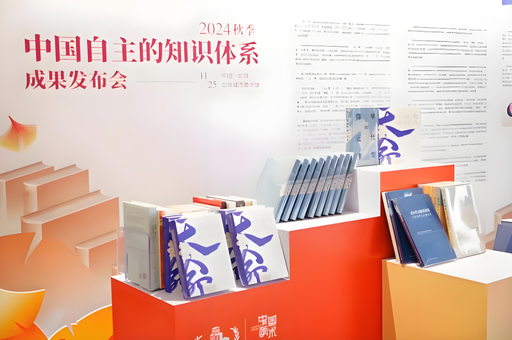


Four books dedicated to independent Chinese knowledge system

FILE PHOTO: Books unveiled at the press conference
On Nov. 25, a press conference was held in Beijing to unveil four significant publications as part of the efforts to construct an independent Chinese knowledge system. At the event, works encapsulating the theoretical connotations and practical implications of Chinese modernization were presented by the Chinese Academy of Social Sciences (CASS), Renmin University of China (RUC), Nankai University (NKU), and Nanjing University (NJU), respectively, covering a variety of subjects including economics, philosophy, history, and sociology.
Ma Jun, a research fellow from the National Academy of Economic Strategy at CASS, introduced the book series 70 Years of Public Finance in China. Compiled under the chief editorship of Gao Peiyong, a CASS Member and former vice president of CASS, the series comprises seven monographs documenting the evolution of public finance in China over the past seven decades. Highlighting the foundational and supporting role of public finance in modernizing China’s system and capacity for governance, the collection provides rich historical data and intellectual resources for innovation within an independent Chinese knowledge system for public finance.
Ma emphasized that this series marks the first step in exploring the independent Chinese knowledge system for public finance, adding that further efforts will be made to deepen this knowledge system, while advancing the development of Chinese systems for disciplines, academia, and discourse in this field.
At present, how scholars specializing in the history of the Qing Dynasty (1644–1911) respond to the “New Qing History” advocated in the West has become a material issue. Yang Nianqun, a professor from the Institute of Qing History at RUC, presented his work How the Mandate of Heaven Was Transferred: The Formation and Practices of the ‘Great Unity’ Outlook in the Qing Dynasty, which offers a comprehensive analysis of da yi tong, or great unity, and its profound implications, bridging historical perspectives with contemporary relevance.
According to Yang, great unity is a core concept in the classical Chinese view of history, crystallizing the ethos and development drivers of Chinese civilization. Examining the trajectory of this idea and its complex, multifaceted structures helps to preserve the legacy of Chinese civilization while enriching related scholarly research.
Zooming in on the evolution of and challenges within Confucianism, Gan Chunsong, a professor from the College of Philosophy at NKU, introduced his research outcome Modern Transformation of Confucianism, which analyzes the ideas of representative figures who shaped Confucianism in modern times, covering nearly all important aspects of the philosophical system’s transformation.
Gan noted that Confucianism is not only an essential component of Chinese traditions, but also a key pillar of the nation’s social development. Tracing its historical trajectory, he argued, is vital for exploring the ongoing evolution and prospects of Confucianism in the new era.
Lin Mingang, a professor from the School of Government at NJU, unveiled Towards the Social Service State: Global Perspective and China’s Reform, focusing on the major theoretical and practical issue of how China might transcend welfare-state models under new historical circumstances. The book first examines the phenomenon in developed Western countries where the responsibility for social services has shifted from governments to broader societal actors, proposing the innovative concept of the “social service state.” It systematically explains the driving forces behind reform and transformation in the social service state and envisions the development of such a state in the digital age.
Lin Mingang asserted that the findings outlined in the book could broaden the perspectives in social security studies, update research content and frameworks, and accelerate the development of an independent Chinese knowledge system for this field.
RUC President Lin Shangli underscored the purpose of the release conference, describing it as a platform for experts and scholars from various disciplines to share research, generate new ideas, and pool wisdom, thus contributing to the development of an independent Chinese knowledge system. He noted that the four works unveiled at the event are deeply rooted in the Chinese context, address pressing contemporary issues, and are oriented towards the future. These contributions, he added, carry profound theoretical and practical significance for preserving China’s cultural heritage, entrenching the nation’s soul, improving the people’s wellbeing, and serving state governance.
Looking ahead, the RUC president expressed his hope for more innovative, exploratory, and cutting-edge works to be presented in future conferences, so that philosophy and social sciences with Chinese characteristics can truly go global and establish its presence within the international academic community.
Editor:Yu Hui
Copyright©2023 CSSN All Rights Reserved